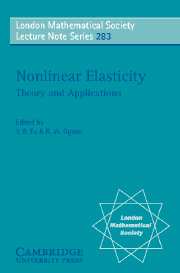Book contents
- Frontmatter
- Contents
- Preface
- 1 Elements of the Theory of Finite Elasticity
- 2 Hyperelastic Bell Materials: Retrospection, Experiment, Theory
- 3 Universal Results in Finite Elasticity
- 4 Equilibrium Solutions for Compressible Nonlinearly Elastic Materials
- 5 Exact Integrals and Solutions for Finite Deformations of the Incompressible Varga Elastic Materials
- 6 Shear
- 7 Elastic Membranes
- 8 Elements of the Theory of Elastic Surfaces
- 9 Singularity Theory and Nonlinear Bifurcation Analysis
- 10 Perturbation Methods and Nonlinear Stability Analysis
- 11 Nonlinear Dispersive Waves in a Circular Rod Composed of a Mooney-Rivlin Material
- 12 Strain-energy Functions with Multiple Local Minima: Modeling Phase Transformations Using Finite Thermo-elasticity
- 13 Pseudo-elasticity and Stress Softening
- Subject Index
4 - Equilibrium Solutions for Compressible Nonlinearly Elastic Materials
Published online by Cambridge University Press: 09 October 2009
- Frontmatter
- Contents
- Preface
- 1 Elements of the Theory of Finite Elasticity
- 2 Hyperelastic Bell Materials: Retrospection, Experiment, Theory
- 3 Universal Results in Finite Elasticity
- 4 Equilibrium Solutions for Compressible Nonlinearly Elastic Materials
- 5 Exact Integrals and Solutions for Finite Deformations of the Incompressible Varga Elastic Materials
- 6 Shear
- 7 Elastic Membranes
- 8 Elements of the Theory of Elastic Surfaces
- 9 Singularity Theory and Nonlinear Bifurcation Analysis
- 10 Perturbation Methods and Nonlinear Stability Analysis
- 11 Nonlinear Dispersive Waves in a Circular Rod Composed of a Mooney-Rivlin Material
- 12 Strain-energy Functions with Multiple Local Minima: Modeling Phase Transformations Using Finite Thermo-elasticity
- 13 Pseudo-elasticity and Stress Softening
- Subject Index
Summary
For homogeneous isotropic incompressible nonlinearly elastic solids in equilibrium, the simplified kinematics arising from the constraint of no volume change has facilitated the analytic solution of a wide variety of boundary-value problems. For compressible materials, the situation is quite different. Firstly, the absence of the isochoric constraint leads to more complicated kinematics. Secondly, since the only controllable deformations are the homogeneous deformations, the discussion of inhomogeneous deformations has to be confined to a particular strain-energy function or class of strain-energy functions. Nevertheless, in recent years, substantial progress has been made in the development of analytic forms for the deformation and in the solution of boundary value problems. The purpose of this Chapter is to review some of these recent developments.
Introduction
For homogeneous isotropic incompressible materials in equilibrium, the simplified kinematics arising from the constraint of no volume change has facilitated the analytic solution of a wide variety of boundary-value problems, see, e.g., Ogden (1982, 1984), Antman (1995), and Chapter 1 of the present volume. Most well-known among these are the controllable or universal deformations, namely, those inhomogeneous deformations which are independent of material properties and thus can be sustained in all incompressible materials in the absence of body forces. For homogeneous isotropic compressible materials, Ericksen (1955) established that the only controllable deformations are homogeneous deformations Thus, inhomogeneous deformations for compressible materials necessarily have to be discussed in the context of a particular strain-energy function or class of strain-energy functions.
- Type
- Chapter
- Information
- Nonlinear ElasticityTheory and Applications, pp. 135 - 159Publisher: Cambridge University PressPrint publication year: 2001
- 24
- Cited by



